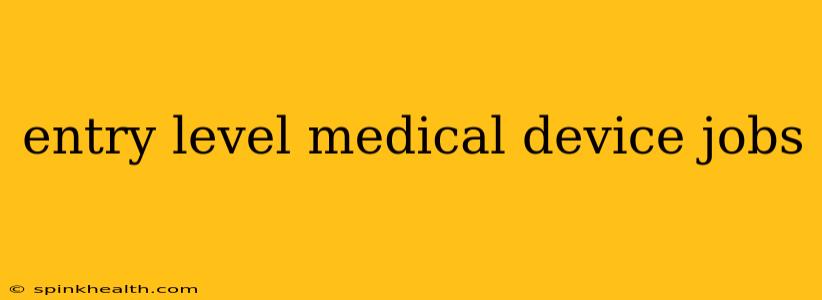The world of medical devices is a fascinating blend of engineering, science, and a deep-seated desire to improve lives. If you're drawn to this field and are looking for entry-level positions, you're in the right place. Landing your first role might seem daunting, but with the right preparation and approach, you can unlock a rewarding career. This isn't just about finding a job; it's about embarking on a journey that contributes to innovation in healthcare.
My name is Alex, and I've spent the last decade navigating the medical device industry. I've seen countless individuals launch successful careers, and I'm here to share the insights I've gained. Let's explore the path to your dream entry-level medical device job.
What are some entry-level medical device jobs?
The beauty of the medical device sector lies in its diversity. Entry-level roles span various departments and skill sets. Here are a few examples:
-
Quality Assurance (QA) Associate: QA is crucial in this industry. Entry-level roles often involve document review, data entry, and assisting with audits, ensuring products meet stringent quality standards. This role is excellent for detail-oriented individuals.
-
Regulatory Affairs Associate: This role focuses on navigating the complex regulatory landscape, ensuring compliance with FDA and international standards. You'll assist with documentation, submissions, and tracking regulatory changes – a critical function in this heavily regulated industry.
-
Research and Development (R&D) Technician: If you're scientifically inclined, this might be the perfect fit. You'll assist senior scientists and engineers in laboratory settings, conducting experiments, gathering data, and supporting research projects.
-
Manufacturing Associate: These roles focus on the production of medical devices. You might be involved in assembly, testing, or quality control on the production line, gaining valuable hands-on experience.
-
Clinical Research Associate (CRA) – Entry-Level: Though often requiring a bachelor's degree, some entry-level positions exist for those with relevant experience or strong academic backgrounds. You'll play a vital part in clinical trials, supporting the collection and management of data.
What skills are needed for entry-level medical device jobs?
Beyond specific educational requirements, certain transferable skills are highly valued:
- Strong attention to detail: Accuracy is paramount in medical device manufacturing and regulation.
- Problem-solving skills: You’ll face challenges; the ability to find solutions is essential.
- Teamwork: Most roles involve collaborating with cross-functional teams.
- Communication skills (written and verbal): Clearly conveying information is crucial in all aspects of the job.
- Computer proficiency: Data analysis and documentation heavily rely on software skills.
What education is needed for entry-level medical device jobs?
The educational requirements vary depending on the specific role. Many entry-level positions require a bachelor's degree in engineering (biomedical, mechanical, electrical), science (biology, chemistry), or related fields. However, some roles, like Manufacturing Associates, might be accessible with an associate's degree or vocational training. Internships are invaluable in gaining experience.
How can I find entry-level medical device jobs?
- Networking: Attend industry events, career fairs, and connect with professionals on LinkedIn.
- Online job boards: Sites like Indeed, LinkedIn, and specialized medical device job boards are excellent resources.
- Company websites: Apply directly through the "Careers" section of medical device company websites.
- Internships: Gain valuable experience through internships, which often lead to full-time positions.
What are the career paths in the medical device industry?
The medical device industry offers many career progression paths. With experience and further education (like an MBA or Master's degree), you can move into roles with more responsibility and leadership, such as project management, engineering management, or regulatory affairs management.
What is the salary range for entry-level medical device jobs?
Salary varies widely depending on location, role, and experience. However, you can expect a competitive starting salary, reflecting the specialized nature of the work.
This is just the beginning of your journey into the exciting world of medical devices. With dedication, the right preparation, and a dash of perseverance, you can successfully launch your career and make a significant contribution to healthcare innovation. Remember, the field is vast, and finding the right niche for your skills and interests is key to a fulfilling career. Good luck!

